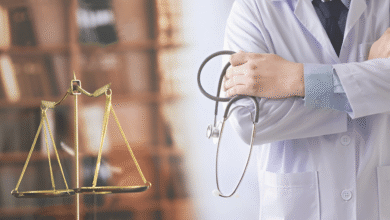Facing Medical Billing Issues? Contact a Healthcare Lawyer Near You
Facing medical billing issues? A healthcare lawyer near you can fight unfair charges, reduce bills, and protect your rights. Get help today.

Facing medical billing issues? You’re not alone. Millions of patients struggle with confusing, inflated, or outright incorrect medical bills every year. From denied insurance claims to surprise out-of-network charges, these billing errors can lead to financial stress and even damaged credit. If you believe you’ve been unfairly charged, consulting a healthcare lawyer near you could be the best way to fight back. A skilled medical billing attorney can review your case, challenge wrongful fees, and ensure you’re not paying more than you legally owe.
Navigating medical billing disputes can feel overwhelming, especially when dealing with hospitals, insurers, and collection agencies. Many patients don’t realize they have legal rights when it comes to incorrect billing practices. Whether you’re dealing with duplicate charges, upcoding, or balance billing, a healthcare lawyer can help you dispute errors, negotiate settlements, and even take legal action if necessary. Don’t let unfair medical bills drain your finances know your rights and seek expert legal assistance to resolve billing conflicts effectively.
Facing Medical Billing Issues? Contact a Healthcare Lawyer Near You
Why You Need a Healthcare Lawyer for Billing Disputes
Medical billing disputes can quickly escalate from frustrating to financially devastating without proper legal intervention. Healthcare lawyers specializing in billing issues bring expert knowledge of complex medical coding systems, insurance regulations, and healthcare laws that most patients simply don’t possess. They can identify subtle forms of billing fraud, upcoding, or unlawful balance billing that untrained eyes might miss, potentially recovering thousands in wrongful charges.
Common Medical Billing Issues
Incorrect Patient Information
Simple clerical errors like wrong names, policy numbers, or birthdates can cause claim denials. Always verify your personal details on bills and insurance statements.
Duplicate Billing
Providers sometimes charge multiple times for the same service. Scrutinize itemized bills for repeated charges for identical procedures or medications.
Upcoding (Billing for More Expensive Services)
This occurs when providers use billing codes for more complex (and costly) treatments than what was actually performed. For example, billing a full physical exam when only a quick check-up occurred.
Unbundling of Services
Some providers illegally break down procedures that should be billed together under a single comprehensive code into separate charges to increase revenue.
Balance Billing Violations
When out-of-network providers charge patients the difference between their fees and what insurance covers – now largely prohibited under the No Surprises Act for emergency and certain non-emergency services.
Charges for Cancelled or Unreceived Services
Patients frequently get billed for tests, treatments, or medications they never actually received or that were cancelled.
Incorrect Quantity Billing
Being charged for multiple doses of medication when only one was administered, or for longer hospital stays than actually occurred.
How to Find the Right Medical Billing Lawyer
Finding the right attorney to handle medical billing disputes can make a significant difference in resolving your case successfully. Start by searching for healthcare or medical billing attorneys in your area who specialize in insurance disputes, fraud cases, or patient advocacy. Look for lawyers with specific experience in healthcare law, the False Claims Act, ERISA, or the No Surprises Act, as these areas directly relate to medical billing issues.
Steps to Take Before Contacting a Lawyer
Before reaching out to a healthcare lawyer about medical billing issues, there are several important steps you should take to strengthen your potential case. First, carefully review all medical bills and request an itemized statement from your provider – this detailed breakdown often reveals errors that aren’t apparent on summary bills. Compare these charges with your medical records and insurance Explanation of Benefits (EOB) to identify any discrepancies like duplicate billing, services you never received, or incorrect procedure codes.
Legal Protections Against Unfair Medical Billing
Patients facing unjust medical bills have several important legal safeguards. The No Surprises Act, effective since 2022, provides critical protection against unexpected out-of-network charges for emergency services and certain non-emergency care at in-network facilities. This federal law requires providers to give good faith cost estimates and establishes an independent dispute resolution process for billing conflicts.
When to Sue for Medical Billing Fraud
Evidence of Deliberate Overbilling
Sue if you can prove intentional fraud through duplicate charges, services never rendered, or inflated procedure costs. Keep itemized bills and medical records as evidence showing discrepancies between treatment received and billed amounts.
Systematic Upcoding or Unbundling
Legal action is warranted when providers consistently bill higher-tiered codes (upcoding) or split bundled services into separate charges (unbundling). These practices artificially inflate costs and violate federal False Claims Act regulations.
Kickbacks or Referral Schemes
Lawsuits apply when providers bill for unnecessary treatments resulting from illegal kickbacks. This includes doctors receiving compensation for patient referrals or prescribing specific services/drugs solely for financial gain rather than medical need.
Falsified Diagnosis Codes
Pursue legal action if providers manipulate diagnosis codes to justify unnecessary tests/procedures. Fraud occurs when billing codes don’t match your actual medical condition or documented treatment plans in your health records.
Balance Billing Violations
Sue if providers illegally bill you for “balance” amounts after insurance payments, especially for emergency care or in-network services. The No Surprises Act prohibits this practice in most scenarios, creating grounds for legal recourse.
Retaliatory Collections Tactics
Consider legal action if providers send erroneous bills to collections despite documented disputes, or use aggressive/illegal collection methods. The FDCPA protects consumers from harassment over potentially fraudulent medical debts.
Whistleblower Opportunities
Employees who witness systemic billing fraud can file qui tam lawsuits under the False Claims Act. These cases allow whistleblowers to receive a portion of recovered funds while exposing large-scale healthcare fraud schemes.
Read More: Know Your Rights: Healthcare Law & Patient Advocacy
Conclusion
Facing medical billing issues? Don’t let confusing charges or aggressive collection attempts overwhelm you. A healthcare lawyer near you can be your strongest ally in resolving billing disputes, protecting your rights, and potentially saving you thousands of dollars. With their expertise in medical billing laws and insurance regulations, these legal professionals can identify errors, negotiate with providers, and even take legal action when necessary.
If you suspect unfair billing practices or feel trapped by mounting medical debt, now is the time to act. Consulting a medical billing attorney could mean the difference between financial strain and a fair resolution. Remember – you have rights as a patient, and legal help is available to ensure you’re not paying more than you should. Take control of your medical bills today by reaching out to a qualified healthcare lawyer near you.
When should I contact a healthcare lawyer about medical bills?
Contact a healthcare lawyer near you if you spot billing errors, face insurance denials, receive surprise out-of-network charges, or experience aggressive debt collection for medical bills.
How can a medical billing attorney help reduce my charges?
A medical billing attorney can review bills for errors, dispute incorrect charges with providers, negotiate settlements, and leverage laws like the No Surprises Act to eliminate unfair fees.
What’s the cost of hiring a healthcare lawyer?
Many healthcare lawyers offer free consultations and work on contingency or flat fees, meaning you only pay if they recover money or resolve your case successfully.
Can a lawyer stop medical debt collectors?
Yes, a healthcare lawyer can halt harassment by enforcing your rights under the FDCPA, demanding debt validation, and disputing invalid claims in collections.
What if my insurance wrongly denied my claim?
A medical billing attorney can appeal denials, force insurers to cover valid claims under ERISA laws, and sue if they act in bad faith.












3 Comments